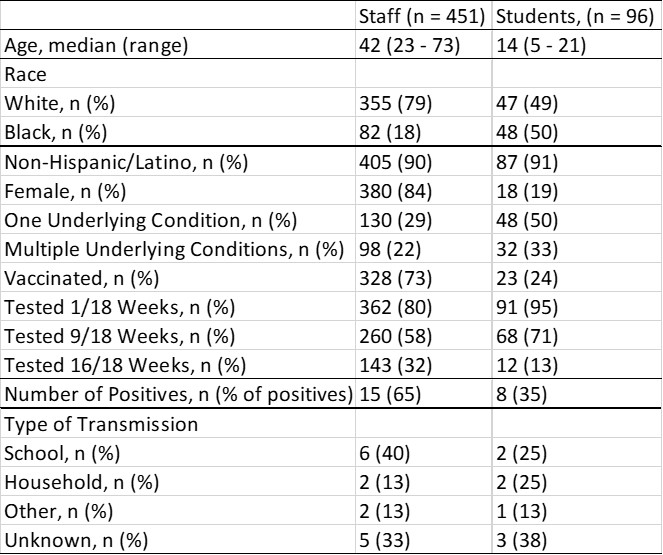Public Health & Prevention
Category: Abstract Submission
Public Health & Prevention I
573 - Weekly COVID-19 screening testing in students and staff of schools for children with intellectual and developmental disabilities (IDD) during the Delta surge
Saturday, April 23, 2022
3:30 PM - 6:00 PM US MT
Poster Number: 573
Publication Number: 573.240
Publication Number: 573.240
Tyler Walsh, Washington University School of Medicine in Saint Louis, St. Louis, MO, United States; Kelly Bono, Washington University in St. Louis School of Medicine, St. Louis, MO, United States; Adwoa Imbeah, Washington University in St. Louis School of Medicine, St. Louis, MO, United States; Michael R. Sherby, Washington University in St. Louis School of Medicine, St. Louis, MO, United States; Christina A. Gurnett, Washington University in St. Louis School of Medicine, St Louis, MO, United States; Jason G. Newland, Washington University in St. Louis, St. Louis, MO, United States

Tyler Walsh, MPH (he/him/his)
Clinical Research Coordinator
Washington University in St. Louis School of Medicine
St. Louis, Missouri, United States
Presenting Author(s)
Background: School closures during the SARS-CoV-2 pandemic prevented students with IDD from accessing important therapies and interventions. Mitigation strategies can be challenging for students with IDD and the staff that support them. We assessed the impact of weekly saliva-based PCR testing for students and staff during the 2021 Delta surge.
Objective: Identify the impact of the Delta surge on weekly testing uptake in schools serving students with intellectual and developmental disabilities.
Design/Methods: A saliva-based PCR test was offered to students and staff for weekly SARS-CoV-2 screening at five Special School District (SSD) schools dedicated to children with IDD. The testing team visited schools to accept saliva samples from the SSD staff, who collected their samples prior to arrival at school. Students provided samples as they arrived at school. The study team used pipettes or sponges to extract saliva from the mouths of students who could not spit independently while SSD staff members provided support. Participants with positive results were notified, as were their school administrators. All positives underwent a standard data collection form to determine if in-school transmission occurred. Clusters were considered as 2 or more positives cases in the same classroom having an epidemiological link. All weekly testing took place between August 16, 2021 to December 17, 2021.
Results: 451 (81%) staff and 96 (15%) students (Table 1) participated in weekly testing (Figure 1). 143 (32%) staff and 12 (13%) students tested 16/18 weeks during the testing period. 328 (73% participating staff) and 23 (24% of participating students) reported being vaccinated (Table 1). During this testing period, 23 (0.43% positive) participants tested positive. Using data provided by the school district we were able to identify more cases outside of the study versus within the study through the week ending on November 12, 2021 (Figure 2). A cluster of 5 cases was identified during the week of 8/30/21 to 9/9/21. The cluster occurred in high school students with profound autism unable to mask and their educators. The educators were masked but did not wear eye protection. Including this cluster, 8 instances of in-school transmission were identified.Conclusion(s): Concern about the emergence of new variants like Delta increased participation; further, an even greater number of staff participated compared to students. More investigation into risk behaviors of staff and students outside of the study could explain the higher number of cases in non-participants.
Table 1 Demographic and Testing Breakdown of Staff and Students in the Schools Participating in Weekly Testing
Demographic and Testing Breakdown of Staff and Students in the Schools Participating in Weekly Testing
Figure 1.jpg) Percentage of Students, Staff, and Total Participants Enrolled in the Study
Percentage of Students, Staff, and Total Participants Enrolled in the Study
Objective: Identify the impact of the Delta surge on weekly testing uptake in schools serving students with intellectual and developmental disabilities.
Design/Methods: A saliva-based PCR test was offered to students and staff for weekly SARS-CoV-2 screening at five Special School District (SSD) schools dedicated to children with IDD. The testing team visited schools to accept saliva samples from the SSD staff, who collected their samples prior to arrival at school. Students provided samples as they arrived at school. The study team used pipettes or sponges to extract saliva from the mouths of students who could not spit independently while SSD staff members provided support. Participants with positive results were notified, as were their school administrators. All positives underwent a standard data collection form to determine if in-school transmission occurred. Clusters were considered as 2 or more positives cases in the same classroom having an epidemiological link. All weekly testing took place between August 16, 2021 to December 17, 2021.
Results: 451 (81%) staff and 96 (15%) students (Table 1) participated in weekly testing (Figure 1). 143 (32%) staff and 12 (13%) students tested 16/18 weeks during the testing period. 328 (73% participating staff) and 23 (24% of participating students) reported being vaccinated (Table 1). During this testing period, 23 (0.43% positive) participants tested positive. Using data provided by the school district we were able to identify more cases outside of the study versus within the study through the week ending on November 12, 2021 (Figure 2). A cluster of 5 cases was identified during the week of 8/30/21 to 9/9/21. The cluster occurred in high school students with profound autism unable to mask and their educators. The educators were masked but did not wear eye protection. Including this cluster, 8 instances of in-school transmission were identified.Conclusion(s): Concern about the emergence of new variants like Delta increased participation; further, an even greater number of staff participated compared to students. More investigation into risk behaviors of staff and students outside of the study could explain the higher number of cases in non-participants.
Table 1
 Demographic and Testing Breakdown of Staff and Students in the Schools Participating in Weekly Testing
Demographic and Testing Breakdown of Staff and Students in the Schools Participating in Weekly TestingFigure 1
.jpg) Percentage of Students, Staff, and Total Participants Enrolled in the Study
Percentage of Students, Staff, and Total Participants Enrolled in the Study